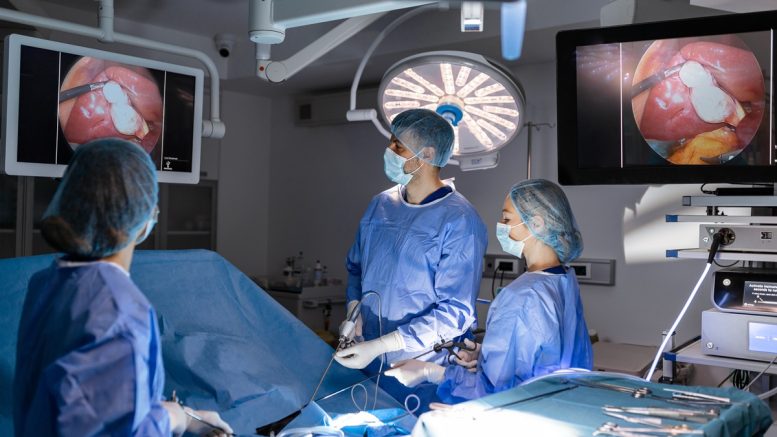Wherever you look, artificial intelligence (AI) is revolutionising entire industries, and healthcare is no exception, where some of the most eye-catching developments can already be seen in operating theatres.
Last year, researchers at Johns Hopkins University (JHU) and Stanford University used AI to train surgical robots to perform surgical tasks, lifting body tissue before suturing a wound with a needle.
Using machine learning, the AI model learnt how to carry out different techniques by analysing specific videos of surgical procedures.
Elsewhere, AI-assisted imaging is being used to analyse detailed tissue structures at an enhanced level – allowing surgeons to detect abnormalities that may be overlooked by the human eye – to deliver more accurate and reliable patient diagnoses.
And with AI-powered intraoperative imaging, surgeons are now equipped with real-time visualisation during surgeries helping them to reduce the risk of damaging critical organs and tissues which, in turn, minimises the likelihood of postoperative complications.
While AI can enhance the accuracy and efficiency in operating theatres, it’s AI’s ability to transform what happens outside of the operating theatre that is, perhaps, of greater importance. Especially since the NHS is investing more than £34 million in surgical backlogs, improving scheduling is a top priority in tackling surgical delays.
Leveraging AI-driven analytics to prevent surgical delays
AI has a major role to play in improving the efficiency of non-surgical tasks such as managing patient lists and staff rotas. It can be used to predict staff scheduling conflicts, periods of peak demand and equipment availability.
Many of these conflicts occur due to operating theatre delays and last-minute cancellations. However, AI provides healthcare workers with a solution to prevent this. By analysing the length of time it takes to conduct surgery and real-time hospital capacity, AI can predict scheduling conflicts before they arise.
AI can also anticipate cases that require additional post-operative care. It does this by identifying trends in previously postponed procedures using past patient data.
Hospitals can use this to prepare for surgeries in advance, ensuring they have the equipment and staff available for high-risk cases. With the necessary support in place, more patients can receive treatment and reduce overall waiting time.
AI also has the power to overcome one of the primary causes of surgery disruptions – staff availability. With healthcare teams struggling with understaffing, AI can predict peak demand periods before they happen enabling them to react in response.
For example, if there is a surge in patient admissions during peak hours, AI can adjust staff schedules accordingly. Suitable staff replacements can be quickly identified for last-minute absences, ensuring procedures remain on schedule without delays.
By implementing AI into hospital scheduling, frontline staff receive manageable schedules, preventing burnout and ensuring that patients get the highest quality of care.
AI’s future and its impact on public perception
Wherever you look, AI has the potential to make a real difference to the NHS. Perhaps that is why so many healthcare professionals are so keen to adopt it.
In 2024, a report by the independent charity, the Health Foundation, found that over half the UK public (54%) and three-quarters (75%) of NHS staff endorse the use of AI in patient care.
However, nearly a third (30%) of the UK public views AI with scepticism, with concerns that AI-generated data can lead to misdiagnosis.
That said, the survey found that the UK public would be more supportive of AI usage if a healthcare professional was present to check for possible errors. Which suggests that if we’re to see the wider introduction of AI in hospitals, we need to account for the concerns of patients.
In other words, healthcare providers must ensure patients’ concerns are kept at the forefront. This would be done by applying safeguarding guidelines and human oversight, making sure AI is not a replacement for clinical experts – but a tool of support.
As more technologies emerge, staying ahead of the curve will be highly beneficial for healthcare providers, making workflow more manageable.
By Lucas Najún Dubos, MD MSc & MBA, Healthcare & Life Sciences Partner at Globant




